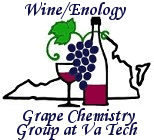 Enology Notes #40 February 28, 2002
Enology Notes #40 February 28, 2002
To: Virginia Vintners
From: Bruce Zoecklein
Subject: Canada's VQA
In 1998, I was invited to British Columbia's wine producing regions, including the famous Okanagan Valley. This region has undergone rapid growth. In discussing the increased volume and quality of wines, I was struck by the importance both winemakers and university personnel placed on their Vintner's Quality Alliance (VQA) program.
The British Columbia and Ontario VQA systems have been in place for some time. These alliances were originally established in response to the competitive nature of the international wine market (NAFTA, for example), and the desire to replace poor quality grapes with high quality ones. The programs are paid, in part, by the industry through a check-off. The main goal in both Ontario and BC is to promote the region's wine industry. This goal has been attained by establishment of formal standards. Wines which are defect-free and true to varietal character are allowed to carry the VQA stamp, and are promoted as supplier products.
In BC, the alliance maintains about twenty-five certified judges. Each winery may submit people for certification, which requires passing sensory tests for defect recognition. An 80% or better score is required for initial judge certification. Certification testing continues on a regular basis. All judges are required to attend monthly workshops on sensory evaluation to maintain their certification. Judges retain their position on the VQA panel for only a certain period.
For VQA wine evaluations, judges meet once per month. Wines are reviewed by twelve judges, not by flights, but simply one wine at a time. It takes three or more judges to reject a wine. If that happens, an additional bottle is opened and the wine reevaluated. This program is mainly sensorial, although some chemical analyses are also conducted.
Wineries can submit pre-bottling tank samples for preliminary approval. This allows the producer to affix the VQA stamp during the bottling operation. Immediately post-bottling, bottled samples are submitted to the VQA and compared to the previously submitted tank sample. In the case of BC, only 100% BC wines are eligible for VQA certification.
Of what value is this program? It has been used to create a positive image for BC wines, particularly in the Okanagan Valley. Because it has been properly promoted, it is recognized. Consumers understand that wines with the VQA stamp have undergone a careful sensory review. To me, however, the greatest surprise was to learn that the VQA system has increased, not decreased, the sense of community among the producers. I am told that it has brought the industry closer together in the shared interest of improving both the image and quality of BC wines. This is a very desirable consequence in view of the ever more competitive global market place!!!!
Many areas now have put into place some form of quality alliance. For example, New York state Pinot producers have banded together to work on issues of common interest, such as quality improvements and marketing. Currently, there are 14 members, each of which has pledged $750 as the first year's dues!
I have twice presented the industry with a plan to establish and conduct some form of quality alliance. A few industry members have recently expressed interest in the establishment of some sort of VQA-like system. If you are interested, send me an email message with the word interested in the subject line. I will add you to a list serve which will be mailed to Virginia Vintners who would like to discuss the creation of some type of quality control system.
Subscription to Enology Notes. All past Enology Notes and Vintner's Corner newsjournals are posted on the Enology-Grape Chemistry Group's web site at: www.fst.vt.edu/zoecklein/index.html. Enology Notes are different in content from this subscription-based Vintner's Corner newsjoural. To be added to the Enology Notes list serve send an email message to bzoeckle@vt.edu with the word "ADD" or "REMOVE" in the subject line.
Dr. Bruce Zoecklein
Associate Professor and Enology Specialist
Head, Enology-Grape Chemistry Group
Department of Food Science and Technology
Virginia Tech, Blacksburg VA 24061
Enology-Grape Chemistry Group Web address: www.fst.vt.edu/zoecklein/index.html
Phone: (540) 231-5325
Fax: (540) 231-9293
E-mail: bzoeckle@vt.edu